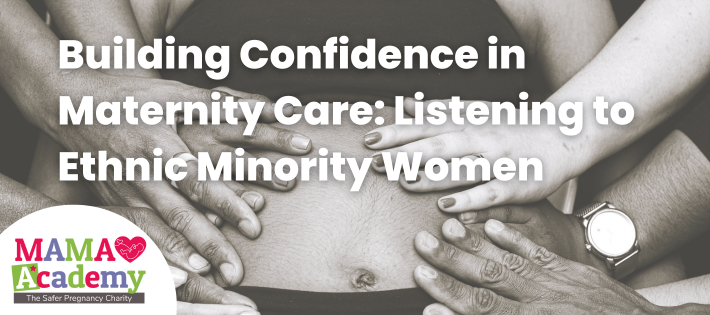Building Confidence in Maternity Care: Listening to Ethnic Minority Women
Published on: 03/09/2025
At MAMA Academy, our mission is to help save babies’ lives and support families through safer pregnancies. Central to that mission is tackling inequalities in maternity care. The government’s recent report, Confidence in maternity care services: engagement with ethnic minority women and maternity staff, shines an urgent spotlight on the stark disparities in maternal outcomes and experiences across the UK.
The statistics are sobering: Black women & birthing people are three times more likely to die in childbirth than White women & birthing people, and Asian women and birthing people are twice as likely. But behind these figures lie people’s stories of mistrust, barriers, and systemic failings that continue to shape maternity journeys.
The report, based on extensive engagement with women and maternity staff, highlights what builds confidence, and what erodes it, in maternity care.
What drives confidence?
Three key factors consistently stood out to expectant parents:
– Continuity of care: seeing the same midwife throughout pregnancy builds trust, enables sensitive conversations, and improves safety.
– Being listened to when women & birthing people’s concerns are taken seriously, they feel respected, included, and empowered in decision-making.
– Cultural and religious respect: understanding people’s backgrounds and needs fosters confidence and better outcomes.
These are not “nice-to-haves.” They are vital components of safe, compassionate, and equitable maternity care.
Barriers women & birthing people face
The report uncovers multiple, interconnected barriers that can erode confidence and, in some cases, put lives at risk:
-Language barriers and lack of interpreters leave parents unable to give informed consent, sometimes with devastating consequences.
-Clinical blind spots mean conditions like jaundice or preeclampsia may go unrecognised on darker skin.
-Stereotypes and bias from assumptions about pain tolerance to dismissive attitudes, undermine trust and safety.
-Power imbalances within maternity teams and between staff and parents often silence advocacy and erode confidence.
-Practical barriers from childcare and travel costs to digital exclusion further limit access to care.
For many parents, these challenges don’t just occur in isolation; they accumulate, compounding feelings of mistrust and fear.
The role of advocacy and community
Many women reported turning to doulas, community groups, or even social media to fill gaps in support and information. While these networks can provide invaluable empowerment, the report emphasises that expectant parents should not have to “fight” for safe care.
Community partnerships such as culturally tailored antenatal classes, peer-led education, and maternity “champions” were highlighted as effective in bridging trust gaps and making NHS services more inclusive.
What staff say
Maternity staff themselves recognised the strain of systemic issues: shortages, limited training, and outdated guidance that doesn’t reflect the needs of diverse communities.
Staff called for:
-More robust, up-to-date research on disparities.
-Better quality ethnicity data to design targeted interventions.
-Greater diversity and representation, particularly in leadership.
They also acknowledged the emotional toll of trying to deliver compassionate care under pressure, and the need for a more supportive culture within maternity teams.
Why this matters
At the heart of the report is a simple truth: trust, empathy, and cultural competence save lives.
When women feel listened to, respected, and supported, they are more likely to share concerns, make informed choices, and engage with care, leading to safer outcomes for both mothers and babies.
But when barriers pile up, whether through poor communication, cultural insensitivity, or systemic inequalities, confidence in services erodes, sometimes with tragic consequences.
Looking ahead
The report makes clear that change is not optional. Reducing disparities in maternal outcomes will require:
– Investment in continuity of care.
– Accessible interpretation services.
– Inclusive training and resources.
– Stronger partnerships with communities.
– Diverse leadership within the NHS.
Above all, it requires a commitment to listening, truly listening, to parents voices and experiences.
Because every parent, regardless of ethnicity or background, deserves to feel safe, heard, and respected during pregnancy, birth, and beyond.
Share your experience
At MAMA Academy, we stand alongside parents and maternity staff calling for change. If you’ve experienced barriers or positive examples of culturally competent care, we’d love to hear from you. Your insights can help shape our work and strengthen our advocacy.
Please share your experiences with us at contact@mamaacademy.org.uk.
Together, we can work towards a future where every mother has confidence in the care she receives — and every baby gets the best possible start.
Read the full report here
